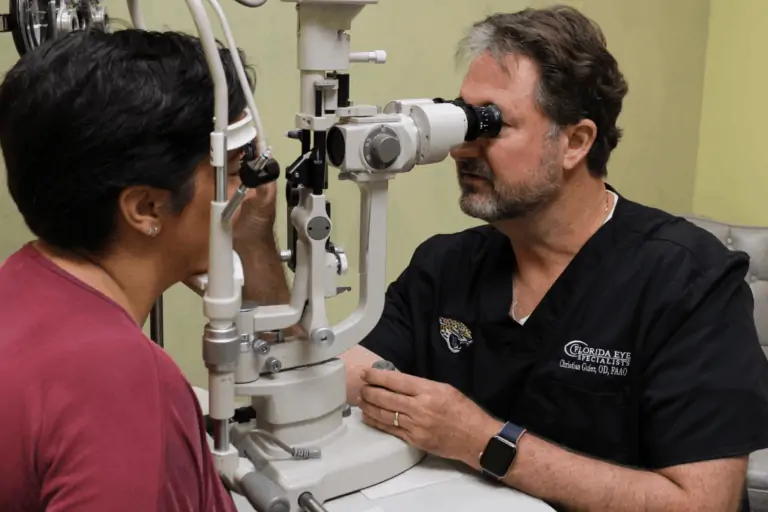Dr. Christian Guier, O.D., F.A.A.O., always puts compassion first when it comes to treating his patients. He is the newest optometrist practicing at Florida Eye Specialists, but he comes to our team with many years of experience. He was the first clinical optometrist at Mayo Clinic, providing care there for 24 years. We are excited to have him join our team of eye care professionals.
We sat down with Dr. Christian Guier to learn more about what drives him to bring excellence in eye care to Northeast Florida.
Q: Good morning, Dr. Guier. To start off, tell us a little bit about yourself.
A: I’m a local. I went to high school in St. Augustine and then I studied chemistry at the University of Florida. I have always been a boater, and for many years I worked at a marina. After graduation, I was added to the management team. While that seemed like a dream job, I knew that I had more to do with my life. I decided to make a big change and study optometry. I met my wife while in school, working my weekend job at a marina in Coconut Grove. After my residency, we moved back to St. Augustine to be close to family. We have two sons and we really enjoy watching them grow up and develop their interests. I still love fishing and boating when I have a chance.
Q: Why did you choose to specialize in optometry?
A: I took some time to explore my options. I spoke with people whose experience and outlook I respected. One person had a very wise insight. He told me that everyone requires eye care in their lifetime. He knew me and my commitment to serving others. We agreed that I would have a tremendous opportunity to impact the lives of so many by becoming an optometrist. Of course, I can tell you that of all of your senses, vision is the very most precious sense. Studies have shown that it is the sense that overwhelmingly, no one would want to have compromised. It is a privilege to aid in protecting another’s eyesight.
Q: Tell us about your career.
When I completed my residency at Bascom Palmer, my wife was pregnant with our oldest son. Our goal was to be closer to our family in St. Augustine. I really wanted to practice at Mayo Clinic. However, they had never had an optometrist practicing in the ophthalmology department at any of the Mayo Clinic campuses. I was a novel hire. One of my colleagues called it “planting the flag for optometry.” It was gratifying to practice with a wide variety of healthcare specialists and wonderful patients for so many years.
While at Mayo Clinic, I had the pleasure of working with Drs. Shetty, Kostick and Hasan. I have always respected their extraordinary skills and commitment to quality outcomes. I also liked them personally, and we got along very well. Over the years, Florida Eye Specialists added many more caring and skilled physicians. The eye care team was working with the people that I grew up with. At some point I knew that I wanted to be a part of this innovative team, utilizing cutting-edge technologies and working with renowned colleagues. That made joining Florida Eye Specialists a perfect fit.
Q: Tell us more about your eye care specialties. How did you come to focus on these areas?
A: An optometrist is a lot like a general practitioner. I consider the entire visual system. That means visual function but also comfort, the coordinated eye movements and the various structures of the eye. Everything that it takes to see well with comfortable eyes.
That said, I have a special interest in unique corneas. For some people, regular glasses and contact lenses cannot offer adequate visual correction. These patients often require specialty contact lenses that are custom made based on the patient’s specific anatomy. I always get excited when working with contact lenses that are uniquely designed to give patients clarity with a contact lens that is also comfortable, stable and healthy.
I also enjoy helping patients who report double vision. This condition can really limit someone’s ability to function efficiently. There are a few options that can help, but often we can use prisms incorporated in spectacles to reduce the extent and frequency of symptoms.
There are many conditions that can affect the eyes. I also see patients to manage glaucoma, monitor the progression of cataracts, or evaluate for diabetic complications. I’m interested in my patients’ well being and always trying to make certain that they are clear and comfortable.
Q: What is your approach to patient care?
A: I feel that I am interactive. Before examining a patient, I like to listen to their account of what is happening. I ask questions like, “Which eye?” “How long?” and, “To what extent?” I learn a lot more by listening than just looking. When I understand how patients recognize their symptoms, I am in a better position to make a careful examination of their eyes. This helps me to address each patient’s needs and concerns.
Treating my patients as if they were a friend or a family member is important. At the end of our conversation, I like to ask if my findings and recommendations are clear and if patients have any more questions for me. I want to make certain my patients know more about their eyes when they leave than when they arrived.

